| Listing 1 - 10 of 13 | << page >> |
Sort by
|
Book
Year: 1966 Publisher: New York, NY ; London : Academic Press,
Abstract | Keywords | Export | Availability | Bookmark
 Loading...
Loading...Choose an application
- Reference Manager
- EndNote
- RefWorks (Direct export to RefWorks)
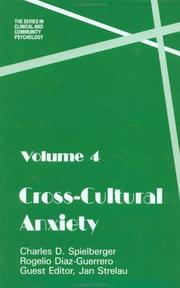
ISBN: 0470989408 Year: 1976 Publisher: Washington, D.C. Hemisphere
Abstract | Keywords | Export | Availability | Bookmark
 Loading...
Loading...Choose an application
- Reference Manager
- EndNote
- RefWorks (Direct export to RefWorks)
Developmental psychology --- Anxiety. --- Anxiété. --- Cross-culrural studies --- Etudes transculturelles
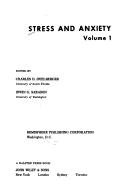
ISBN: 0470816058 0470754125 Year: 1975 Publisher: Washington, D.C. Hemisphere
Abstract | Keywords | Export | Availability | Bookmark
 Loading...
Loading...Choose an application
- Reference Manager
- EndNote
- RefWorks (Direct export to RefWorks)
Book
ISBN: 0387897208 0387896759 9786612830181 0387896767 128283018X Year: 2010 Publisher: New York : Springer,
Abstract | Keywords | Export | Availability | Bookmark
 Loading...
Loading...Choose an application
- Reference Manager
- EndNote
- RefWorks (Direct export to RefWorks)
International Handbook of Anger Constituent and Concomitant Biological, Psychological, and Social Processes Edited by Michael Potegal, University of Minnesota Medical Center Gerhard Stemmler, Philipps-Universitat, Marburg, Germany Charles Spielberger, University of South Florida From the individual rage-driven violence of domestic abuse to the destructive causes and lasting consequences of large scale ethnic and political conflict, anger and its effects are ubiquitous in human life, and are the focus of intense study across many scientific disciplines: fields as varied as affective neuroscience, health science, psychology, psychophysiology, and sociology have all contributed to recent advances in the understanding of anger. The editors of the International Handbook of Anger bring these major contributions together for a unique portrayal of the many aspects of anger—evolutionary and biological bases, behavioral processes and effects, physiological concomitants, clinical aspects, and role in the larger social picture—with coverage that is both wide-ranging and integrative. State-of-the-art findings by highly regarded experts are organized for maximum utility, with extensive cross-referencing between chapters and editors’ introductory commentary linking the book’s sections. A sampling of the coverage in the Handbook: Historical views and roles of anger in Western and nonwestern cultures. Current genetic, neurological, neurochemical, and psychophysiological perspectives. Cross-cultural expressions: facial, vocal, and linguistic. Affective, motivational, and cognitive processes in anger. Gender differences in anger triggers, experience, and behavior. Anger in development and across the lifespan: Infancy, childhood and adulthood Assessing anger, hostility, and anger control. Clinical aspects: psychopathology, anger and chronic pain, "Type A" behavior and cardiovascular health. Anger in family, small-group, and large-group conflict. The International Handbook of Anger presents a wealth of deep and detailed knowledge relevant to clinical and health psychology, social work, family studies, and anger management, among other fields. Its depth and breadth of coverage will make it a definitive volume informing research and practice in the years ahead.
Philosophy (General). --- Psychology, clinical. --- Anger --- Social Environment --- Aggression --- Sociology --- Behavioral Symptoms --- Emotions --- Social Behavior --- Behavior --- Behavior and Behavior Mechanisms --- Social Sciences --- Anthropology, Education, Sociology and Social Phenomena --- Psychiatry and Psychology --- Clinical Psychology --- Psychology --- Psychiatry --- Health & Biological Sciences --- Anger. --- Temper. --- Indignation --- Madness --- Wrath --- Rage --- Psychology. --- Sociology. --- Health psychology. --- Neuropsychology. --- Health Psychology. --- Sociology, general. --- Temper --- Neurophysiology --- Psychophysiology --- Social theory --- Social sciences --- Health psychology --- Health psychology, Clinical --- Psychology, Clinical health --- Psychology, Health --- Salutogenesis --- Clinical psychology --- Medicine and psychology
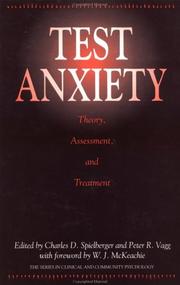
ISBN: 0891162127 Year: 1995 Publisher: London Taylor & Francis
Abstract | Keywords | Export | Availability | Bookmark
 Loading...
Loading...Choose an application
- Reference Manager
- EndNote
- RefWorks (Direct export to RefWorks)
Klinische psychologie --- specifieke problemen --- specifieke problemen. --- Specifieke problemen.
Book
Year: 1980 Publisher: Hasselt Heideland-Orbis
Abstract | Keywords | Export | Availability | Bookmark
 Loading...
Loading...Choose an application
- Reference Manager
- EndNote
- RefWorks (Direct export to RefWorks)
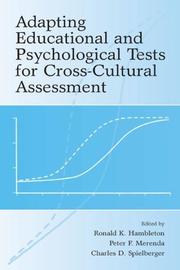
ISBN: 1135676577 1282322818 9786612322815 1410611752 9781410611758 0805830251 9780805830255 9781135676575 9781282322813 6612322810 9781135676520 9781135676568 9780805861761 Year: 2005 Publisher: Mahwah, N.J. L. Erlbaum Associates
Abstract | Keywords | Export | Availability | Bookmark
 Loading...
Loading...Choose an application
- Reference Manager
- EndNote
- RefWorks (Direct export to RefWorks)
Adapting Educational and Psychological Tests for Cross-Cultural Assessment critically examines and advances new methods and practices for adapting tests for cross-cultural assessment and research. The International Test Commission (ITC) guidelines for test adaptation and conceptual and methodological issues in test adaptation are described in detail, and questions of ethics and concern for validity of test scores in cross-cultural contexts are carefully examined. Advances in test translation and adaptation methodology, including statistical identification of flawed test items, establish
Educational tests and measurements --- Psychological tests --- Mental tests --- Psychological assessment --- Tests, Psychological --- Psychology --- Testing --- Clinical psychology --- Educational assessment --- Educational measurements --- Tests and measurements in education --- Psychological tests for children --- Psychometrics --- Students --- Examinations --- Design and construction --- Methodology --- Rating of
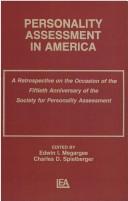
ISBN: 9780805809282 0805809287 Year: 1992 Publisher: Hillsdale (N.J.): Erlbaum, Lawrence, Associates,
Abstract | Keywords | Export | Availability | Bookmark
 Loading...
Loading...Choose an application
- Reference Manager
- EndNote
- RefWorks (Direct export to RefWorks)
Year: 1970 Publisher: Palo Alto: Consulting psychologists press,
Abstract | Keywords | Export | Availability | Bookmark
 Loading...
Loading...Choose an application
- Reference Manager
- EndNote
- RefWorks (Direct export to RefWorks)
Facteurs étudiés : anxiété Application : individuelle/collective Temps de passation : 10'
Year: 1993 Publisher: Paris: ECPA,
Abstract | Keywords | Export | Availability | Bookmark
 Loading...
Loading...Choose an application
- Reference Manager
- EndNote
- RefWorks (Direct export to RefWorks)
Facteurs étudiés : anxiété Adapté du "State-Trait-Anxiety Inventory" (Forme Y) de Spielberger (STAI-Y), l'Inventaire d'Anxiété Etat-Trait est destiné à évaluer, grâce à deux échelles de 20 items, l'état et le trait d'anxiété :L'Echelle d'Anxiété-Etat qui évalue les sentiments d'appréhension, la tension, la nervositéet l'inquiétude que le sujet ressent au moment de la consultation.L'Echelle d'Anxiété-Trait qui permet d'apprécier les mêmes sentiments que le sujet ressent "habituellement".La première échelle est un indicateur des modifications transitoires de l'anxiété provoquées par des situations aversives ou thérapeutiques.La seconde échelle évalue l'anxiété comme disposition stable. Elle permet d'identifier les sujets anxieux au sein de groupes. Elle constitue ainsi le point de départ d'une action thérapeutique.Le STAI-Y est aussi utilisé pour étudier l'effet de l'anxiété sur la mémoire, la performance en apprentissage ou l'ajustement à différentes situations stressantes. Application : individuelle/collective Temps de passation : 10'
| Listing 1 - 10 of 13 | << page >> |
Sort by
|

 Search
Search Feedback
Feedback About UniCat
About UniCat  Help
Help News
News